Analyzing Healthcare Policy: The Influence of Power and Politics
VerifiedAdded on 2023/04/17
|8
|2071
|377
Essay
AI Summary
This essay provides a comprehensive analysis of healthcare policy, focusing on the interplay between power dynamics and political influences within the healthcare system. It explores the policy cycle, highlighting its significance in identifying and achieving healthcare objectives. The essay also examines the legal contexts of healthcare policies, differentiating between health policies and government policy documents. Furthermore, it discusses the evolution of healthcare approaches, contrasting the 'new public health' approach with previous methods, particularly in the context of Australia's Medicare system. The analysis extends to the social determinants of health, emphasizing the impact of sociological issues on individual well-being. Finally, the essay delves into the relevance of 'power' in policy development and change, examining how power dynamics influence decision-making and thought control within healthcare settings. The essay concludes by underscoring the vital role of power and politics in shaping healthcare systems and their impact on individual health outcomes.
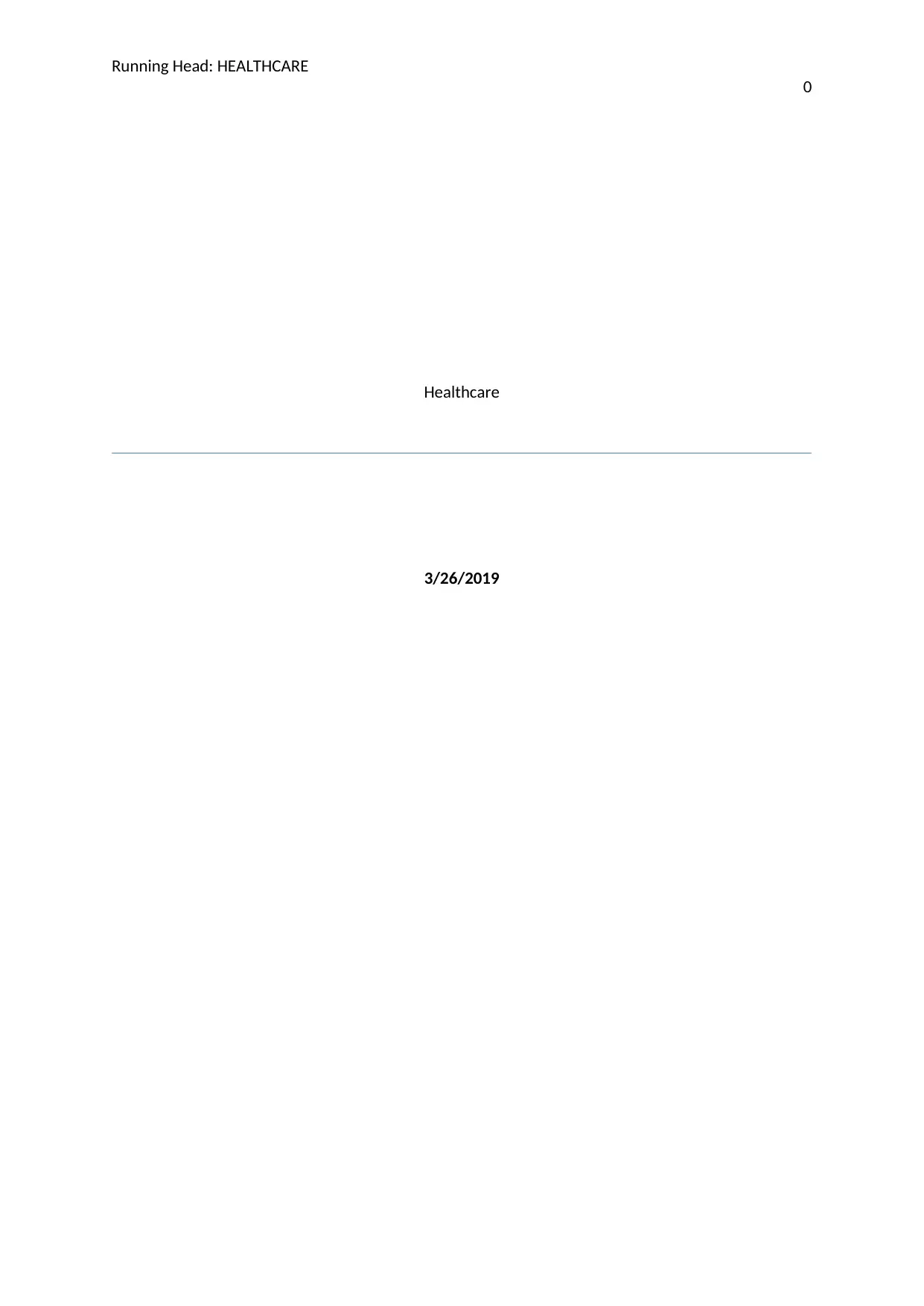
Running Head: HEALTHCARE
0
Healthcare
3/26/2019
0
Healthcare
3/26/2019
Paraphrase This Document
Need a fresh take? Get an instant paraphrase of this document with our AI Paraphraser
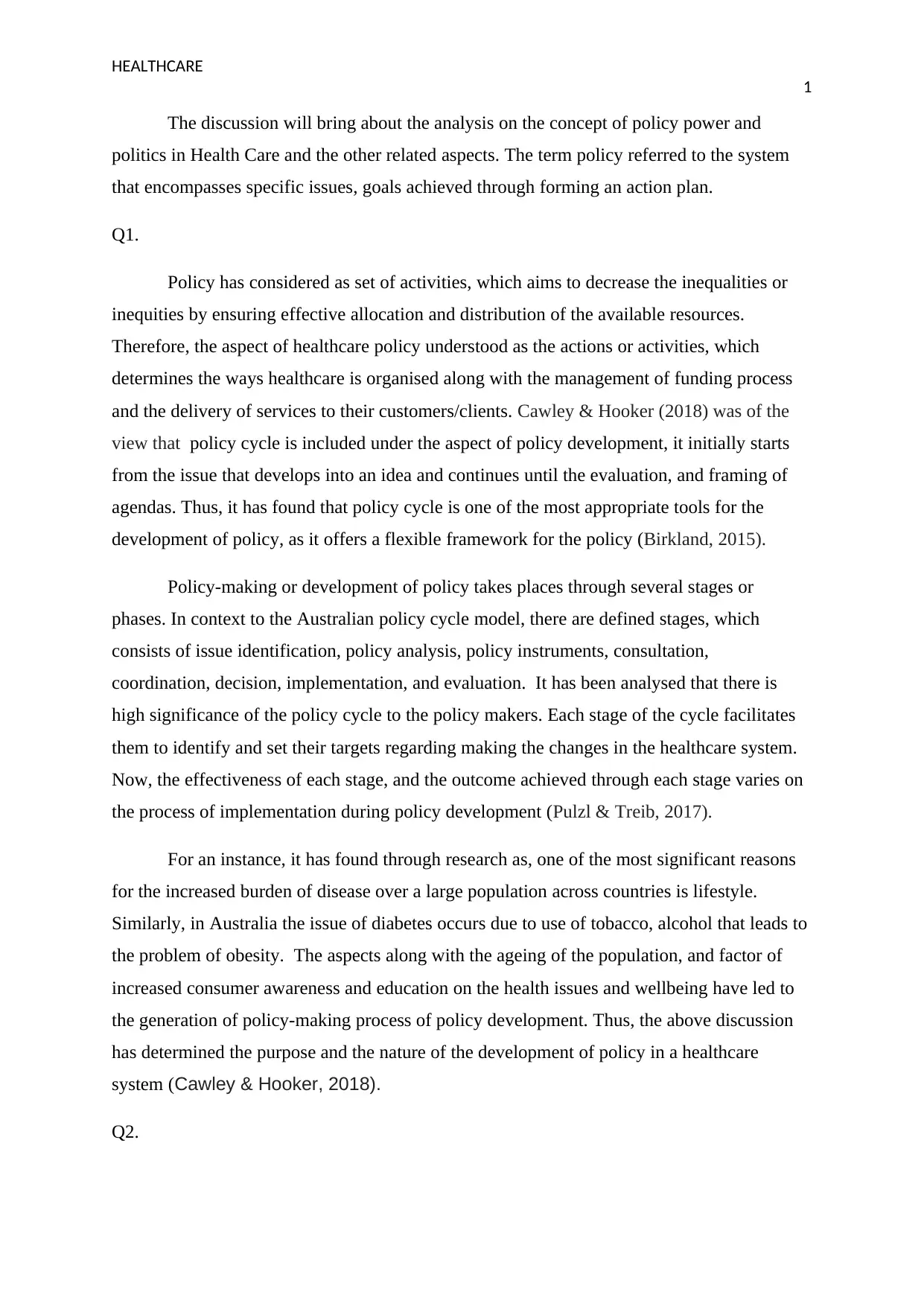
HEALTHCARE
1
The discussion will bring about the analysis on the concept of policy power and
politics in Health Care and the other related aspects. The term policy referred to the system
that encompasses specific issues, goals achieved through forming an action plan.
Q1.
Policy has considered as set of activities, which aims to decrease the inequalities or
inequities by ensuring effective allocation and distribution of the available resources.
Therefore, the aspect of healthcare policy understood as the actions or activities, which
determines the ways healthcare is organised along with the management of funding process
and the delivery of services to their customers/clients. Cawley & Hooker (2018) was of the
view that policy cycle is included under the aspect of policy development, it initially starts
from the issue that develops into an idea and continues until the evaluation, and framing of
agendas. Thus, it has found that policy cycle is one of the most appropriate tools for the
development of policy, as it offers a flexible framework for the policy (Birkland, 2015).
Policy-making or development of policy takes places through several stages or
phases. In context to the Australian policy cycle model, there are defined stages, which
consists of issue identification, policy analysis, policy instruments, consultation,
coordination, decision, implementation, and evaluation. It has been analysed that there is
high significance of the policy cycle to the policy makers. Each stage of the cycle facilitates
them to identify and set their targets regarding making the changes in the healthcare system.
Now, the effectiveness of each stage, and the outcome achieved through each stage varies on
the process of implementation during policy development (Pulzl & Treib, 2017).
For an instance, it has found through research as, one of the most significant reasons
for the increased burden of disease over a large population across countries is lifestyle.
Similarly, in Australia the issue of diabetes occurs due to use of tobacco, alcohol that leads to
the problem of obesity. The aspects along with the ageing of the population, and factor of
increased consumer awareness and education on the health issues and wellbeing have led to
the generation of policy-making process of policy development. Thus, the above discussion
has determined the purpose and the nature of the development of policy in a healthcare
system (Cawley & Hooker, 2018).
Q2.
1
The discussion will bring about the analysis on the concept of policy power and
politics in Health Care and the other related aspects. The term policy referred to the system
that encompasses specific issues, goals achieved through forming an action plan.
Q1.
Policy has considered as set of activities, which aims to decrease the inequalities or
inequities by ensuring effective allocation and distribution of the available resources.
Therefore, the aspect of healthcare policy understood as the actions or activities, which
determines the ways healthcare is organised along with the management of funding process
and the delivery of services to their customers/clients. Cawley & Hooker (2018) was of the
view that policy cycle is included under the aspect of policy development, it initially starts
from the issue that develops into an idea and continues until the evaluation, and framing of
agendas. Thus, it has found that policy cycle is one of the most appropriate tools for the
development of policy, as it offers a flexible framework for the policy (Birkland, 2015).
Policy-making or development of policy takes places through several stages or
phases. In context to the Australian policy cycle model, there are defined stages, which
consists of issue identification, policy analysis, policy instruments, consultation,
coordination, decision, implementation, and evaluation. It has been analysed that there is
high significance of the policy cycle to the policy makers. Each stage of the cycle facilitates
them to identify and set their targets regarding making the changes in the healthcare system.
Now, the effectiveness of each stage, and the outcome achieved through each stage varies on
the process of implementation during policy development (Pulzl & Treib, 2017).
For an instance, it has found through research as, one of the most significant reasons
for the increased burden of disease over a large population across countries is lifestyle.
Similarly, in Australia the issue of diabetes occurs due to use of tobacco, alcohol that leads to
the problem of obesity. The aspects along with the ageing of the population, and factor of
increased consumer awareness and education on the health issues and wellbeing have led to
the generation of policy-making process of policy development. Thus, the above discussion
has determined the purpose and the nature of the development of policy in a healthcare
system (Cawley & Hooker, 2018).
Q2.
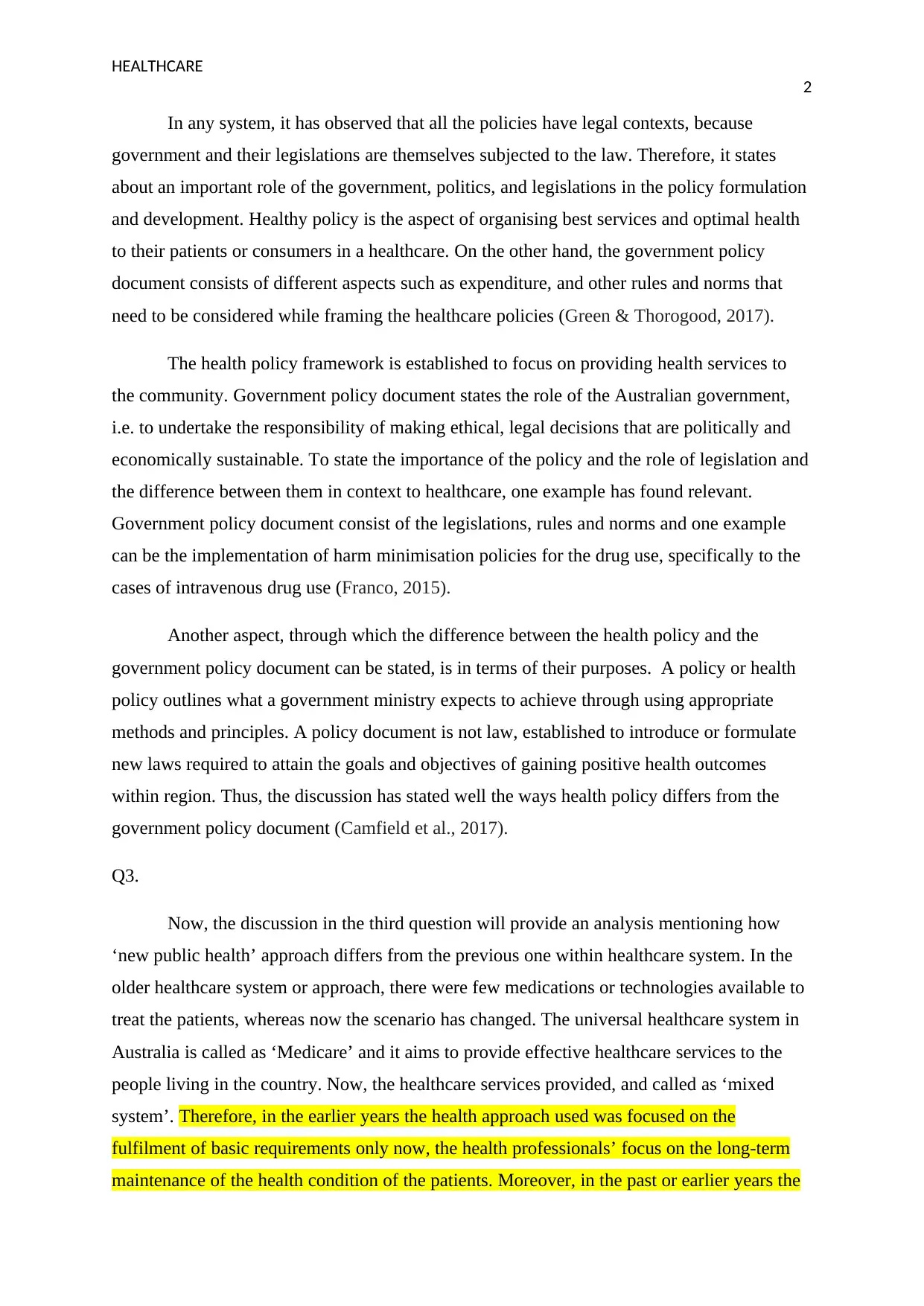
HEALTHCARE
2
In any system, it has observed that all the policies have legal contexts, because
government and their legislations are themselves subjected to the law. Therefore, it states
about an important role of the government, politics, and legislations in the policy formulation
and development. Healthy policy is the aspect of organising best services and optimal health
to their patients or consumers in a healthcare. On the other hand, the government policy
document consists of different aspects such as expenditure, and other rules and norms that
need to be considered while framing the healthcare policies (Green & Thorogood, 2017).
The health policy framework is established to focus on providing health services to
the community. Government policy document states the role of the Australian government,
i.e. to undertake the responsibility of making ethical, legal decisions that are politically and
economically sustainable. To state the importance of the policy and the role of legislation and
the difference between them in context to healthcare, one example has found relevant.
Government policy document consist of the legislations, rules and norms and one example
can be the implementation of harm minimisation policies for the drug use, specifically to the
cases of intravenous drug use (Franco, 2015).
Another aspect, through which the difference between the health policy and the
government policy document can be stated, is in terms of their purposes. A policy or health
policy outlines what a government ministry expects to achieve through using appropriate
methods and principles. A policy document is not law, established to introduce or formulate
new laws required to attain the goals and objectives of gaining positive health outcomes
within region. Thus, the discussion has stated well the ways health policy differs from the
government policy document (Camfield et al., 2017).
Q3.
Now, the discussion in the third question will provide an analysis mentioning how
‘new public health’ approach differs from the previous one within healthcare system. In the
older healthcare system or approach, there were few medications or technologies available to
treat the patients, whereas now the scenario has changed. The universal healthcare system in
Australia is called as ‘Medicare’ and it aims to provide effective healthcare services to the
people living in the country. Now, the healthcare services provided, and called as ‘mixed
system’. Therefore, in the earlier years the health approach used was focused on the
fulfilment of basic requirements only now, the health professionals’ focus on the long-term
maintenance of the health condition of the patients. Moreover, in the past or earlier years the
2
In any system, it has observed that all the policies have legal contexts, because
government and their legislations are themselves subjected to the law. Therefore, it states
about an important role of the government, politics, and legislations in the policy formulation
and development. Healthy policy is the aspect of organising best services and optimal health
to their patients or consumers in a healthcare. On the other hand, the government policy
document consists of different aspects such as expenditure, and other rules and norms that
need to be considered while framing the healthcare policies (Green & Thorogood, 2017).
The health policy framework is established to focus on providing health services to
the community. Government policy document states the role of the Australian government,
i.e. to undertake the responsibility of making ethical, legal decisions that are politically and
economically sustainable. To state the importance of the policy and the role of legislation and
the difference between them in context to healthcare, one example has found relevant.
Government policy document consist of the legislations, rules and norms and one example
can be the implementation of harm minimisation policies for the drug use, specifically to the
cases of intravenous drug use (Franco, 2015).
Another aspect, through which the difference between the health policy and the
government policy document can be stated, is in terms of their purposes. A policy or health
policy outlines what a government ministry expects to achieve through using appropriate
methods and principles. A policy document is not law, established to introduce or formulate
new laws required to attain the goals and objectives of gaining positive health outcomes
within region. Thus, the discussion has stated well the ways health policy differs from the
government policy document (Camfield et al., 2017).
Q3.
Now, the discussion in the third question will provide an analysis mentioning how
‘new public health’ approach differs from the previous one within healthcare system. In the
older healthcare system or approach, there were few medications or technologies available to
treat the patients, whereas now the scenario has changed. The universal healthcare system in
Australia is called as ‘Medicare’ and it aims to provide effective healthcare services to the
people living in the country. Now, the healthcare services provided, and called as ‘mixed
system’. Therefore, in the earlier years the health approach used was focused on the
fulfilment of basic requirements only now, the health professionals’ focus on the long-term
maintenance of the health condition of the patients. Moreover, in the past or earlier years the
⊘ This is a preview!⊘
Do you want full access?
Subscribe today to unlock all pages.

Trusted by 1+ million students worldwide
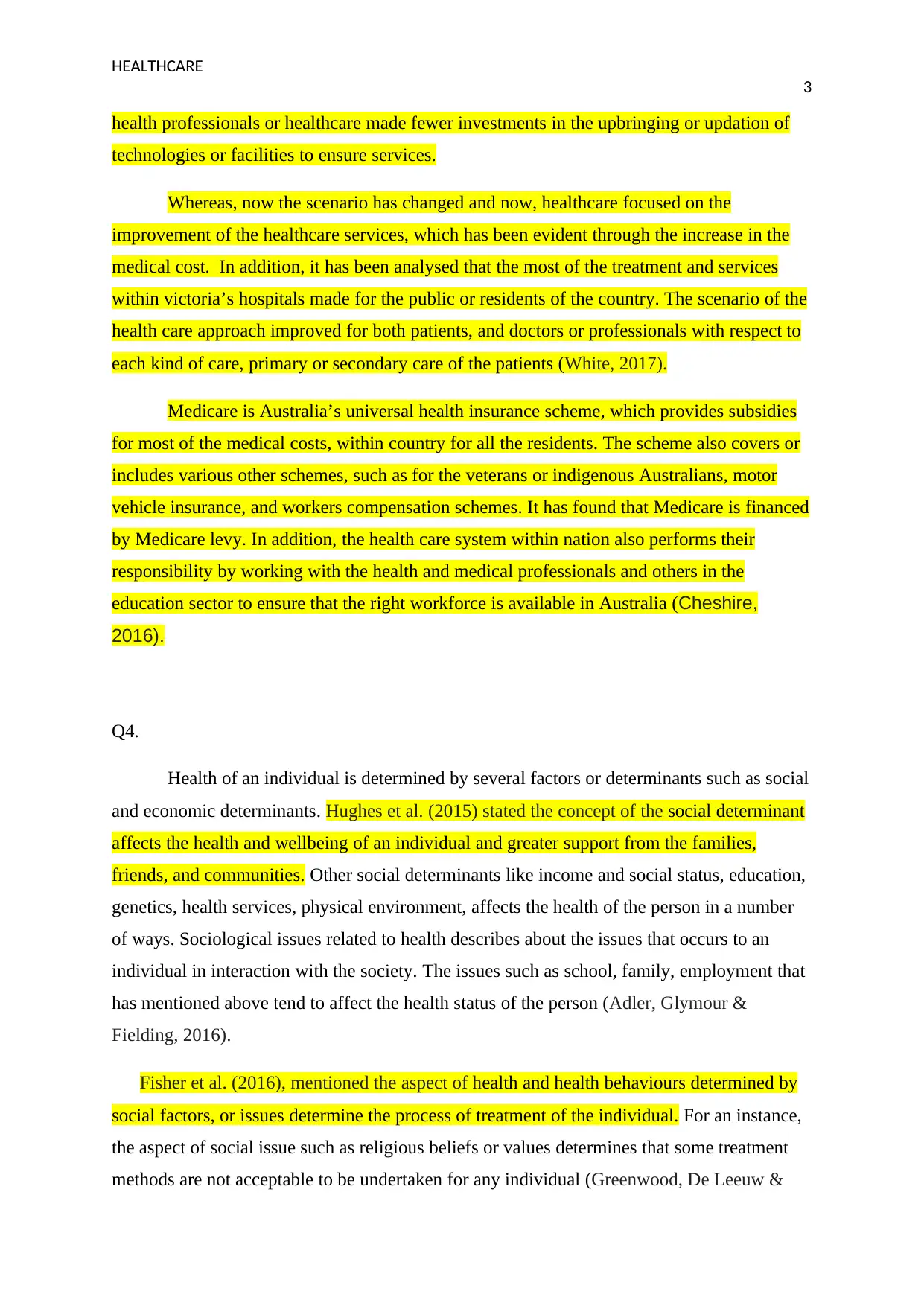
HEALTHCARE
3
health professionals or healthcare made fewer investments in the upbringing or updation of
technologies or facilities to ensure services.
Whereas, now the scenario has changed and now, healthcare focused on the
improvement of the healthcare services, which has been evident through the increase in the
medical cost. In addition, it has been analysed that the most of the treatment and services
within victoria’s hospitals made for the public or residents of the country. The scenario of the
health care approach improved for both patients, and doctors or professionals with respect to
each kind of care, primary or secondary care of the patients (White, 2017).
Medicare is Australia’s universal health insurance scheme, which provides subsidies
for most of the medical costs, within country for all the residents. The scheme also covers or
includes various other schemes, such as for the veterans or indigenous Australians, motor
vehicle insurance, and workers compensation schemes. It has found that Medicare is financed
by Medicare levy. In addition, the health care system within nation also performs their
responsibility by working with the health and medical professionals and others in the
education sector to ensure that the right workforce is available in Australia (Cheshire,
2016).
Q4.
Health of an individual is determined by several factors or determinants such as social
and economic determinants. Hughes et al. (2015) stated the concept of the social determinant
affects the health and wellbeing of an individual and greater support from the families,
friends, and communities. Other social determinants like income and social status, education,
genetics, health services, physical environment, affects the health of the person in a number
of ways. Sociological issues related to health describes about the issues that occurs to an
individual in interaction with the society. The issues such as school, family, employment that
has mentioned above tend to affect the health status of the person (Adler, Glymour &
Fielding, 2016).
Fisher et al. (2016), mentioned the aspect of health and health behaviours determined by
social factors, or issues determine the process of treatment of the individual. For an instance,
the aspect of social issue such as religious beliefs or values determines that some treatment
methods are not acceptable to be undertaken for any individual (Greenwood, De Leeuw &
3
health professionals or healthcare made fewer investments in the upbringing or updation of
technologies or facilities to ensure services.
Whereas, now the scenario has changed and now, healthcare focused on the
improvement of the healthcare services, which has been evident through the increase in the
medical cost. In addition, it has been analysed that the most of the treatment and services
within victoria’s hospitals made for the public or residents of the country. The scenario of the
health care approach improved for both patients, and doctors or professionals with respect to
each kind of care, primary or secondary care of the patients (White, 2017).
Medicare is Australia’s universal health insurance scheme, which provides subsidies
for most of the medical costs, within country for all the residents. The scheme also covers or
includes various other schemes, such as for the veterans or indigenous Australians, motor
vehicle insurance, and workers compensation schemes. It has found that Medicare is financed
by Medicare levy. In addition, the health care system within nation also performs their
responsibility by working with the health and medical professionals and others in the
education sector to ensure that the right workforce is available in Australia (Cheshire,
2016).
Q4.
Health of an individual is determined by several factors or determinants such as social
and economic determinants. Hughes et al. (2015) stated the concept of the social determinant
affects the health and wellbeing of an individual and greater support from the families,
friends, and communities. Other social determinants like income and social status, education,
genetics, health services, physical environment, affects the health of the person in a number
of ways. Sociological issues related to health describes about the issues that occurs to an
individual in interaction with the society. The issues such as school, family, employment that
has mentioned above tend to affect the health status of the person (Adler, Glymour &
Fielding, 2016).
Fisher et al. (2016), mentioned the aspect of health and health behaviours determined by
social factors, or issues determine the process of treatment of the individual. For an instance,
the aspect of social issue such as religious beliefs or values determines that some treatment
methods are not acceptable to be undertaken for any individual (Greenwood, De Leeuw &
Paraphrase This Document
Need a fresh take? Get an instant paraphrase of this document with our AI Paraphraser
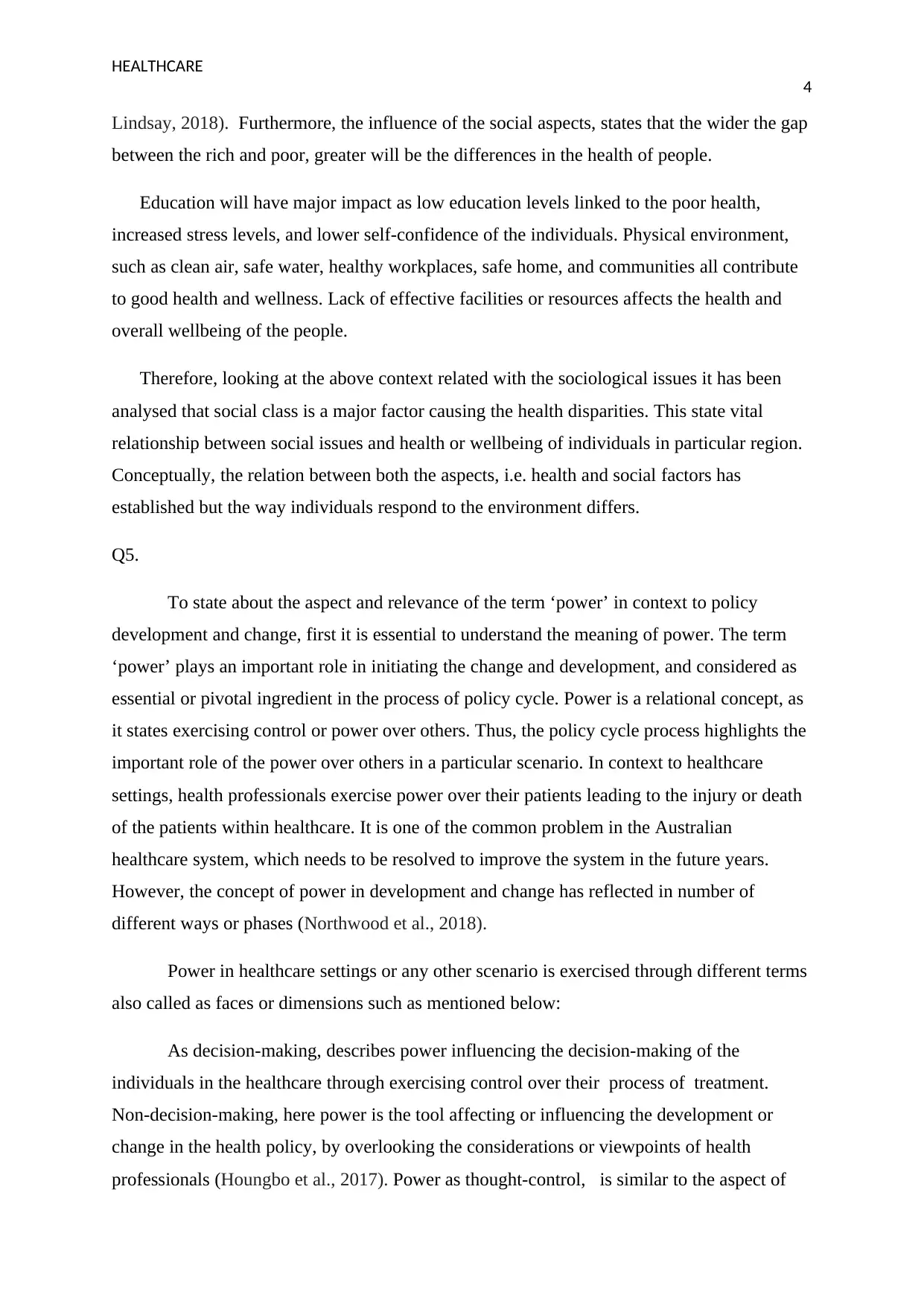
HEALTHCARE
4
Lindsay, 2018). Furthermore, the influence of the social aspects, states that the wider the gap
between the rich and poor, greater will be the differences in the health of people.
Education will have major impact as low education levels linked to the poor health,
increased stress levels, and lower self-confidence of the individuals. Physical environment,
such as clean air, safe water, healthy workplaces, safe home, and communities all contribute
to good health and wellness. Lack of effective facilities or resources affects the health and
overall wellbeing of the people.
Therefore, looking at the above context related with the sociological issues it has been
analysed that social class is a major factor causing the health disparities. This state vital
relationship between social issues and health or wellbeing of individuals in particular region.
Conceptually, the relation between both the aspects, i.e. health and social factors has
established but the way individuals respond to the environment differs.
Q5.
To state about the aspect and relevance of the term ‘power’ in context to policy
development and change, first it is essential to understand the meaning of power. The term
‘power’ plays an important role in initiating the change and development, and considered as
essential or pivotal ingredient in the process of policy cycle. Power is a relational concept, as
it states exercising control or power over others. Thus, the policy cycle process highlights the
important role of the power over others in a particular scenario. In context to healthcare
settings, health professionals exercise power over their patients leading to the injury or death
of the patients within healthcare. It is one of the common problem in the Australian
healthcare system, which needs to be resolved to improve the system in the future years.
However, the concept of power in development and change has reflected in number of
different ways or phases (Northwood et al., 2018).
Power in healthcare settings or any other scenario is exercised through different terms
also called as faces or dimensions such as mentioned below:
As decision-making, describes power influencing the decision-making of the
individuals in the healthcare through exercising control over their process of treatment.
Non-decision-making, here power is the tool affecting or influencing the development or
change in the health policy, by overlooking the considerations or viewpoints of health
professionals (Houngbo et al., 2017). Power as thought-control, is similar to the aspect of
4
Lindsay, 2018). Furthermore, the influence of the social aspects, states that the wider the gap
between the rich and poor, greater will be the differences in the health of people.
Education will have major impact as low education levels linked to the poor health,
increased stress levels, and lower self-confidence of the individuals. Physical environment,
such as clean air, safe water, healthy workplaces, safe home, and communities all contribute
to good health and wellness. Lack of effective facilities or resources affects the health and
overall wellbeing of the people.
Therefore, looking at the above context related with the sociological issues it has been
analysed that social class is a major factor causing the health disparities. This state vital
relationship between social issues and health or wellbeing of individuals in particular region.
Conceptually, the relation between both the aspects, i.e. health and social factors has
established but the way individuals respond to the environment differs.
Q5.
To state about the aspect and relevance of the term ‘power’ in context to policy
development and change, first it is essential to understand the meaning of power. The term
‘power’ plays an important role in initiating the change and development, and considered as
essential or pivotal ingredient in the process of policy cycle. Power is a relational concept, as
it states exercising control or power over others. Thus, the policy cycle process highlights the
important role of the power over others in a particular scenario. In context to healthcare
settings, health professionals exercise power over their patients leading to the injury or death
of the patients within healthcare. It is one of the common problem in the Australian
healthcare system, which needs to be resolved to improve the system in the future years.
However, the concept of power in development and change has reflected in number of
different ways or phases (Northwood et al., 2018).
Power in healthcare settings or any other scenario is exercised through different terms
also called as faces or dimensions such as mentioned below:
As decision-making, describes power influencing the decision-making of the
individuals in the healthcare through exercising control over their process of treatment.
Non-decision-making, here power is the tool affecting or influencing the development or
change in the health policy, by overlooking the considerations or viewpoints of health
professionals (Houngbo et al., 2017). Power as thought-control, is similar to the aspect of
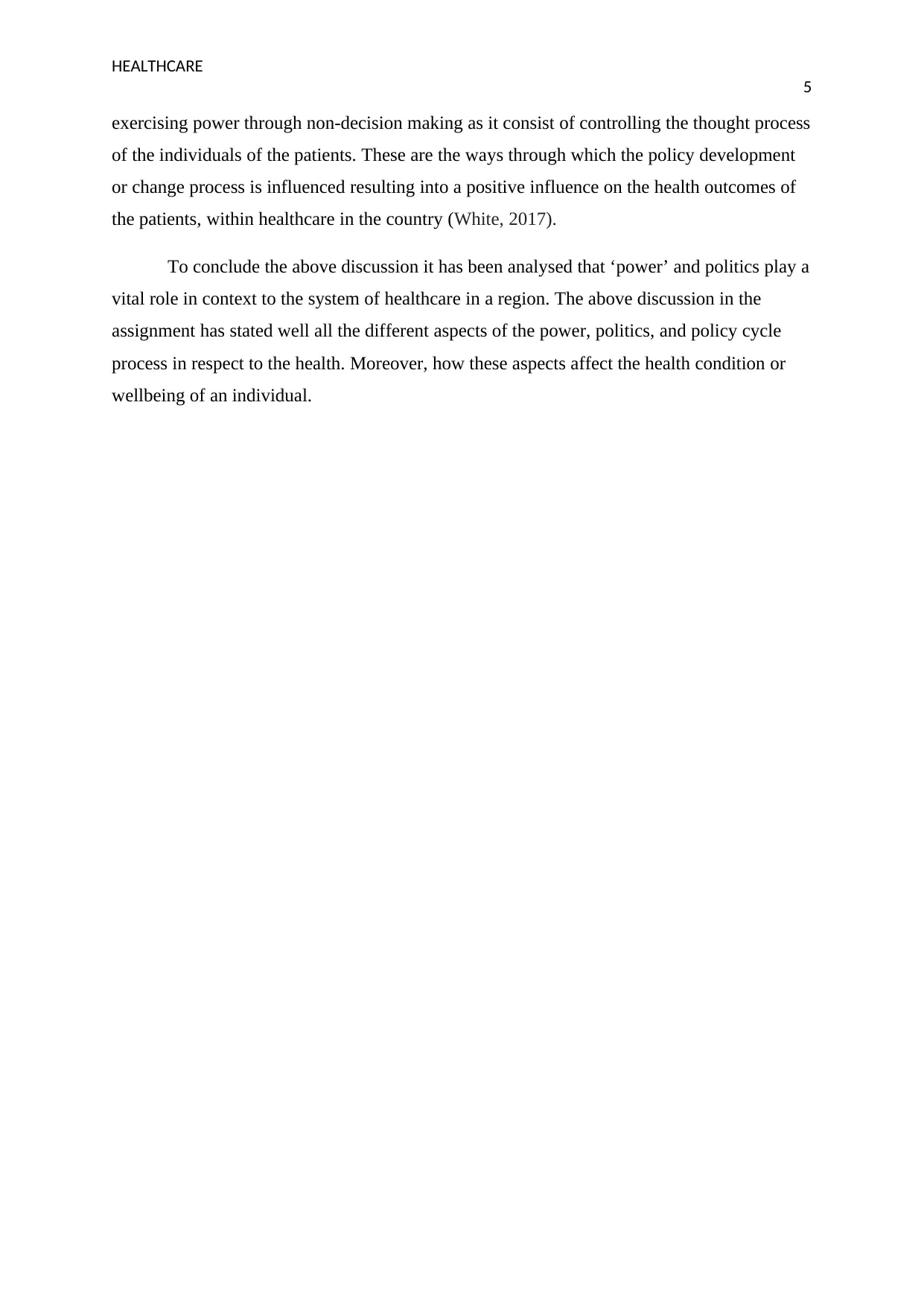
HEALTHCARE
5
exercising power through non-decision making as it consist of controlling the thought process
of the individuals of the patients. These are the ways through which the policy development
or change process is influenced resulting into a positive influence on the health outcomes of
the patients, within healthcare in the country (White, 2017).
To conclude the above discussion it has been analysed that ‘power’ and politics play a
vital role in context to the system of healthcare in a region. The above discussion in the
assignment has stated well all the different aspects of the power, politics, and policy cycle
process in respect to the health. Moreover, how these aspects affect the health condition or
wellbeing of an individual.
5
exercising power through non-decision making as it consist of controlling the thought process
of the individuals of the patients. These are the ways through which the policy development
or change process is influenced resulting into a positive influence on the health outcomes of
the patients, within healthcare in the country (White, 2017).
To conclude the above discussion it has been analysed that ‘power’ and politics play a
vital role in context to the system of healthcare in a region. The above discussion in the
assignment has stated well all the different aspects of the power, politics, and policy cycle
process in respect to the health. Moreover, how these aspects affect the health condition or
wellbeing of an individual.
⊘ This is a preview!⊘
Do you want full access?
Subscribe today to unlock all pages.

Trusted by 1+ million students worldwide
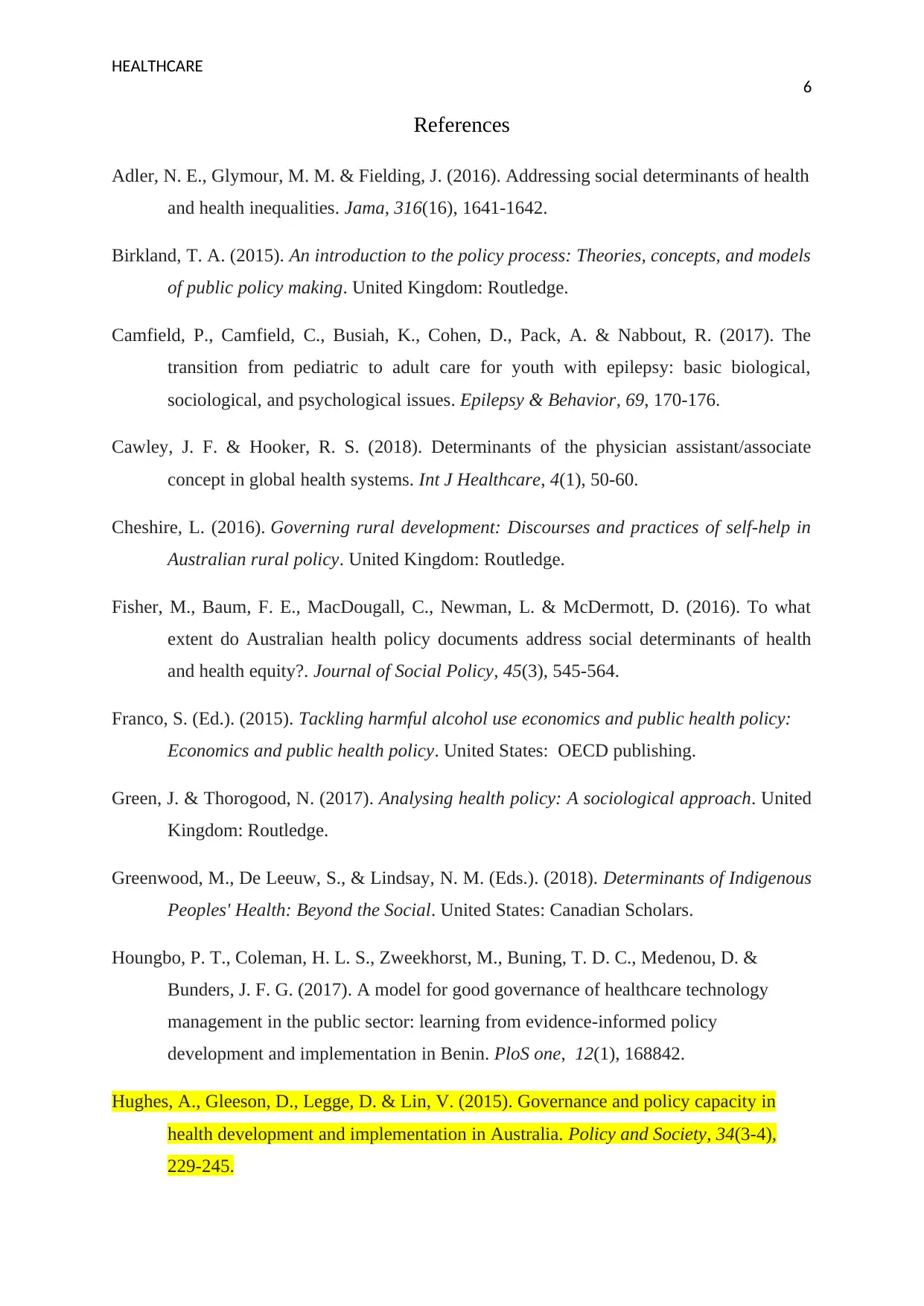
HEALTHCARE
6
References
Adler, N. E., Glymour, M. M. & Fielding, J. (2016). Addressing social determinants of health
and health inequalities. Jama, 316(16), 1641-1642.
Birkland, T. A. (2015). An introduction to the policy process: Theories, concepts, and models
of public policy making. United Kingdom: Routledge.
Camfield, P., Camfield, C., Busiah, K., Cohen, D., Pack, A. & Nabbout, R. (2017). The
transition from pediatric to adult care for youth with epilepsy: basic biological,
sociological, and psychological issues. Epilepsy & Behavior, 69, 170-176.
Cawley, J. F. & Hooker, R. S. (2018). Determinants of the physician assistant/associate
concept in global health systems. Int J Healthcare, 4(1), 50-60.
Cheshire, L. (2016). Governing rural development: Discourses and practices of self-help in
Australian rural policy. United Kingdom: Routledge.
Fisher, M., Baum, F. E., MacDougall, C., Newman, L. & McDermott, D. (2016). To what
extent do Australian health policy documents address social determinants of health
and health equity?. Journal of Social Policy, 45(3), 545-564.
Franco, S. (Ed.). (2015). Tackling harmful alcohol use economics and public health policy:
Economics and public health policy. United States: OECD publishing.
Green, J. & Thorogood, N. (2017). Analysing health policy: A sociological approach. United
Kingdom: Routledge.
Greenwood, M., De Leeuw, S., & Lindsay, N. M. (Eds.). (2018). Determinants of Indigenous
Peoples' Health: Beyond the Social. United States: Canadian Scholars.
Houngbo, P. T., Coleman, H. L. S., Zweekhorst, M., Buning, T. D. C., Medenou, D. &
Bunders, J. F. G. (2017). A model for good governance of healthcare technology
management in the public sector: learning from evidence-informed policy
development and implementation in Benin. PloS one, 12(1), 168842.
Hughes, A., Gleeson, D., Legge, D. & Lin, V. (2015). Governance and policy capacity in
health development and implementation in Australia. Policy and Society, 34(3-4),
229-245.
6
References
Adler, N. E., Glymour, M. M. & Fielding, J. (2016). Addressing social determinants of health
and health inequalities. Jama, 316(16), 1641-1642.
Birkland, T. A. (2015). An introduction to the policy process: Theories, concepts, and models
of public policy making. United Kingdom: Routledge.
Camfield, P., Camfield, C., Busiah, K., Cohen, D., Pack, A. & Nabbout, R. (2017). The
transition from pediatric to adult care for youth with epilepsy: basic biological,
sociological, and psychological issues. Epilepsy & Behavior, 69, 170-176.
Cawley, J. F. & Hooker, R. S. (2018). Determinants of the physician assistant/associate
concept in global health systems. Int J Healthcare, 4(1), 50-60.
Cheshire, L. (2016). Governing rural development: Discourses and practices of self-help in
Australian rural policy. United Kingdom: Routledge.
Fisher, M., Baum, F. E., MacDougall, C., Newman, L. & McDermott, D. (2016). To what
extent do Australian health policy documents address social determinants of health
and health equity?. Journal of Social Policy, 45(3), 545-564.
Franco, S. (Ed.). (2015). Tackling harmful alcohol use economics and public health policy:
Economics and public health policy. United States: OECD publishing.
Green, J. & Thorogood, N. (2017). Analysing health policy: A sociological approach. United
Kingdom: Routledge.
Greenwood, M., De Leeuw, S., & Lindsay, N. M. (Eds.). (2018). Determinants of Indigenous
Peoples' Health: Beyond the Social. United States: Canadian Scholars.
Houngbo, P. T., Coleman, H. L. S., Zweekhorst, M., Buning, T. D. C., Medenou, D. &
Bunders, J. F. G. (2017). A model for good governance of healthcare technology
management in the public sector: learning from evidence-informed policy
development and implementation in Benin. PloS one, 12(1), 168842.
Hughes, A., Gleeson, D., Legge, D. & Lin, V. (2015). Governance and policy capacity in
health development and implementation in Australia. Policy and Society, 34(3-4),
229-245.
Paraphrase This Document
Need a fresh take? Get an instant paraphrase of this document with our AI Paraphraser
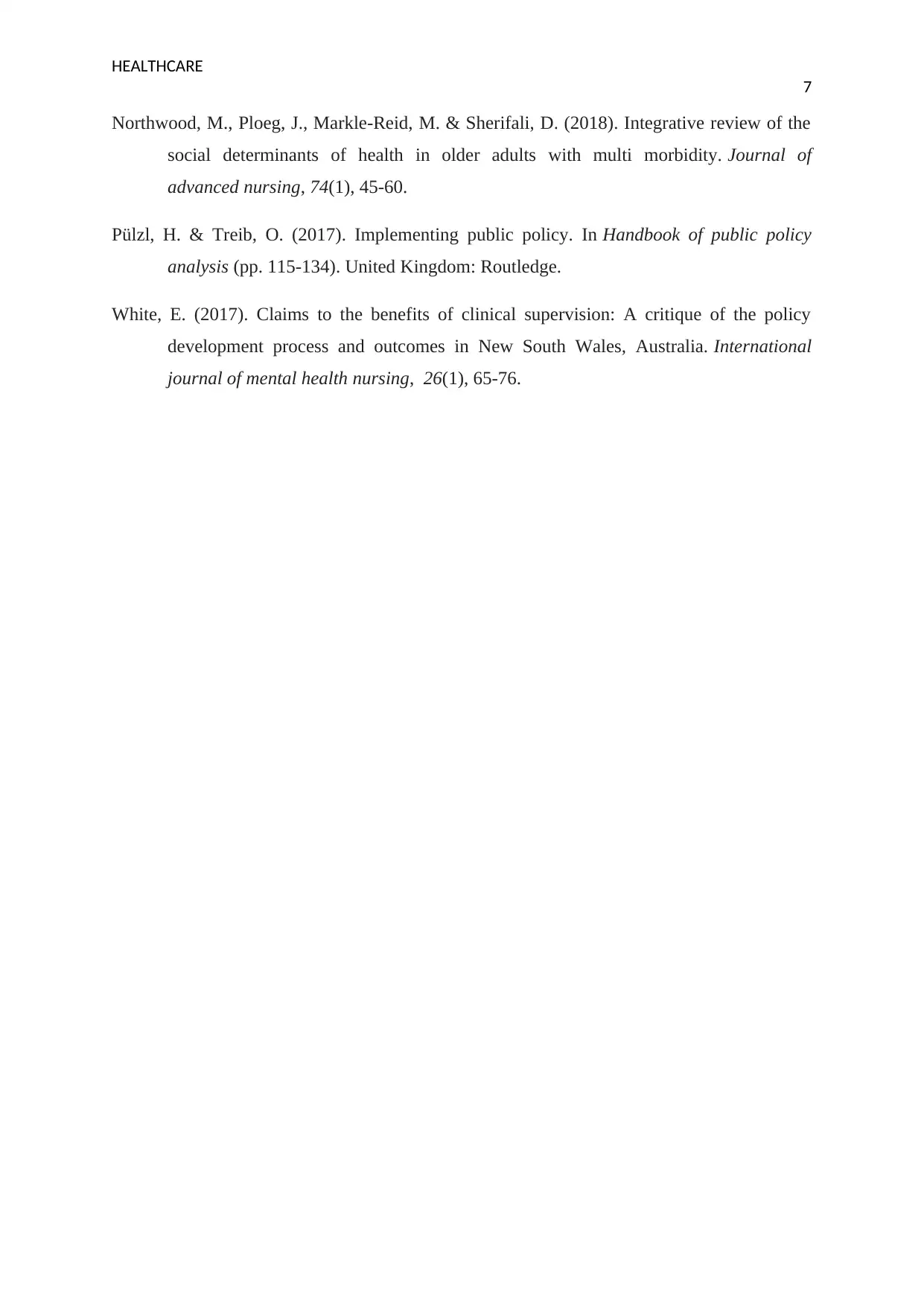
HEALTHCARE
7
Northwood, M., Ploeg, J., Markle‐Reid, M. & Sherifali, D. (2018). Integrative review of the
social determinants of health in older adults with multi morbidity. Journal of
advanced nursing, 74(1), 45-60.
Pülzl, H. & Treib, O. (2017). Implementing public policy. In Handbook of public policy
analysis (pp. 115-134). United Kingdom: Routledge.
White, E. (2017). Claims to the benefits of clinical supervision: A critique of the policy
development process and outcomes in New South Wales, Australia. International
journal of mental health nursing, 26(1), 65-76.
7
Northwood, M., Ploeg, J., Markle‐Reid, M. & Sherifali, D. (2018). Integrative review of the
social determinants of health in older adults with multi morbidity. Journal of
advanced nursing, 74(1), 45-60.
Pülzl, H. & Treib, O. (2017). Implementing public policy. In Handbook of public policy
analysis (pp. 115-134). United Kingdom: Routledge.
White, E. (2017). Claims to the benefits of clinical supervision: A critique of the policy
development process and outcomes in New South Wales, Australia. International
journal of mental health nursing, 26(1), 65-76.
1 out of 8
Related Documents
Your All-in-One AI-Powered Toolkit for Academic Success.
+13062052269
info@desklib.com
Available 24*7 on WhatsApp / Email
![[object Object]](/_next/static/media/star-bottom.7253800d.svg)
Unlock your academic potential
Copyright © 2020–2026 A2Z Services. All Rights Reserved. Developed and managed by ZUCOL.





